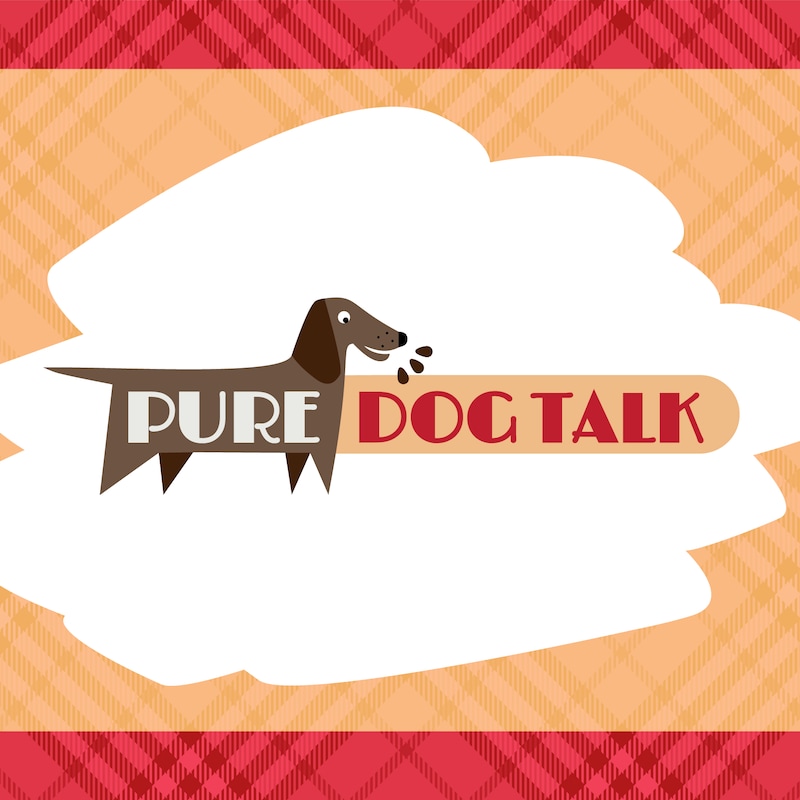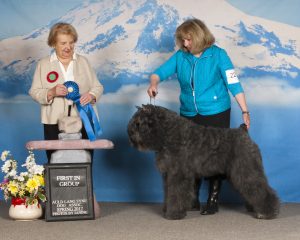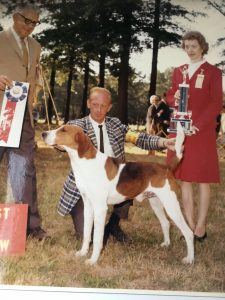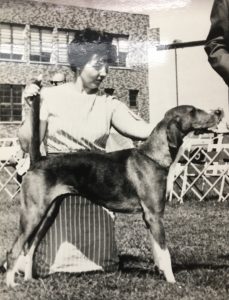
210 – Bob & Polly Smith: Foxhounds and Dog Shows
16th August 2018 • Pure Dog Talk • Laura Reeves
Shownotes
Foxhounds, Fox Hunting and Dog Shows
Two of the most revered and well-known all-breed judges in the American Kennel Club system, Dr. Bob and Polly Smith share their journey starting as breeder-owner-handlers in American Foxhounds. Polly was started by a Chow Chow breeder who tutored her for school. She showed her first dog at the National Capitol Kennel Club when she was 4 years old and won a blue ribbon. She was hooked from that moment. Bob had dogs all his life, eventually adopting a War Dog his brother brought back after WWII.“High Church”
“A great mistake is made,” Polly said, “because of low entries at AKC shows, that American Foxhounds are considered a rare breed. There are thousands of Foxhounds out there. The pack hounds associated with horses and riding to the hounds are considered the ‘High Church’ of foxhounds. Many dogs also participate in Night Hunting and Field trials.” Many different “strains” make up the American Foxhound breed. Bob and Polly shared in depth historical information on these various lines of dogs. Listen to the podcast or check out their book on the subject.Song of the hounds
“Fox hunting, it’s something… more like a religion than hobby or sport,” Polly observed, noting that she rode to the hounds regularly while she was in college. She strongly recommends the fictional “Sister Jane” book series by Rita Mae Brown for an upclose understanding of the sport. Talking about training Foxhounds for the chase, starting them as puppies with an older bitch, foxes who understand scent even better than the dogs, Polly shared her tremendous enthusiasm for the sport. The dogs are judged on speed, drive and finding the fox. They are often run in huge enclosures to ensure the safety of all participants. “The intent of foxhunting is not to kill (the fox),” Bob said. “It’s the fun of the chase.” Polly added that the foxes even get in to the game, knowing when the dogs are put away and they can come out for marshmallows and treats. “Hounds sing,” Polly said. “It’s beautiful music. You can tell when a hound strikes. We’re the dummies when it comes to scenting conditions. The foxes know best, then hounds, then us. “We tried to keep hunting instinct in our dogs. I think we’ve gone away from that in AKC.”A different era in dog shows
Bob added that dog shows, particularly, are in rough place. “The state of the sport is iffy,” Bob said. “You don’t have the passion, sportsmanship is not as strong. It’s more of a business than it used to be.” Polly added that professional handlers of their time, people like George Ward, Dick Cooper and Bobby Fisher, were able to show any breed and were supportive of owner handlers. “We don’t have as much of that,” Polly said. “They taught us a lot. They didn’t give up an inch in the group ring but they were very helpful in bringing you along.” Bob added that he and Polly always set up with handlers when they were showing dogs, watching, learning and helping them. Polly said many people today don’t take the long view of a breeding program and instead dog shows are “a race to see how fast you can finish” a dog. “We have to change with the times, I guess,” Polly said. “But some of us kick and scream going down. The history should not be lost.”
Read Full Transcript
Laura: Pure Dog Talk is the voice of purebred dogs. We talked to the legends of the sport and give you the tips and tools to create an awesome life with your purebred dog, from showing to preservation breeding, from competitive obedience to field work, from agility to therapy dogs, and all the fun in between. Your passion is our purpose.
Laura: Welcome to pure dog talk. I'm your host, Laura Reeves, and I have today two very, very special guests, Dr Bob and Polly Smith, two all-breed judges in our system and people long steeped in history in this sport. And I'm so excited and particularly because I understand, I just heard this Dr. Bob, you're going to retire at the end of this year..
Bob: I'm not retiring, I'm not accepting assignments except those shows that I particularly want to do... after this year.
Polly: I'm not retiring.
Laura: But... we're not going to see you as often. And so this was a wonderful opportunities, so thank you. So tell us, tell our listeners the 411. I know some of it, I'm sure I know not even half of it. So how did you get started in dogs? Why did you get got started in dogs?
Polly: Many years ago -- my grandparents raised me -- and my grandmother sent me next door to be tutored. And the lady that tutored me had Chow Chows and showed them. And so I would study in the morning and then we would play dog show in the afternoon and that's how she got me to study. And then the first show I showed at was National Capital when I was 4 years old. And I won't tell you the year
Laura: It was just yesterday!
Polly: Ha ha...And I won a blue ribbon. That road -- Columbia Pike -- had a number of top breeders -- Bill Tuten who bred bulldogs (Rootin' Tutin Bulldogs) lived on it and the Noppenbergers who raised Collies lived on it.
Laura: And what state and city?
Polly: This was in Ellicott City, Maryland. And that's how I actually got started in dogs. And after we got married, um, got interested.
Laura: He's your responsibility, is that what you're saying?
Polly: Yes.
Bob: Well, I had had had dogs all my life, one type or another from mixed breeds to purebreds. I was fifth of six children and my oldest brother came back from World War II and brought a German shepherd that had been a war dog, actually the messenger dog, and he became my companion, basically. That was my start in dogs, but I didn't get interested in dog shows until after Polly and I were married.
Laura: And did you start with the Foxhounds right away? How did we come to Foxhounds?
Polly: Bob went back to graduate school down in Columbia, South Carolina. And he was working at the hospital at night, so he got me a German Shepherd. And the lady that ran the Columbia Kennel Club in South Carolina was Lucy Bostick, a well known Cocker Breeder, and she got us into the Columbia Kennel Club with this German Shepherd that Bob bought me. Unfortunately it won at a match the whole working group that Frank MacArthur was judging. He was a handler from them.
Bob: He later became a judge.
Laura: Yes. The name again, familiar,
Polly: And of course we thought we had the top dog in the world, which turned out NOT to be the top dog by any means.
Bob: Not even the top dog . ??? (I don't know but probably hilarious
Polly: Later on, when when Bob went to graduate school at Vanderbilt for his PhD, we met Chuck Trotter and his first wife, Becky, who showed Afghan Hounds. And Becky also showed a Foxhound for Dr. Fred Vaught and we ended up getting an American Foxhound from Dr. Vaught and that was the beginning of our winning and our success. We got out of German Shepherds.
Bob: At that time we had moved from South Carolina -- actually from Vanderbilt -- up to Michigan. I was teaching there and a member of the Kalamazoo Kennel Club was attending a match that we were at with the Foxhound and I didn't win the Hound group. I guess I went second in the Hound group and he said that's the end of the German shepherds and it was.
Polly: It was Tony Stamm of Anstamm Scotties. And we got in the Kalamazoo Kennel Club.
Laura: And how long were you guys in Michigan for?
Bob and Polly: Seven years. Seven years. And then we went to Mississippi and then we cam back to Virginia.
Laura: That's where I think of you is Virginia
Bob: But we were in Mississippi for about 20 years.
Polly: And then we moved to Virginia and we've been there ever since. Bob is a native of Virginia and I'm a native, of course, of Maryland; so we were very happy to get home.
Laura: Yes, yes. That would definitely be more comfortable than Michigan. If you're from the southeast then Michigan would be terrifying. Oh my goodness. And so talk to me about American Foxhounds and then maybe we can do a little bit of compare and contrast because we've added so many new Hound breeds that fall into this group that even I am confused sometimes.
Polly: Well the great mistake that's made among people in AKC is because of the low entry and the low number of dogs registered with the American Kennel Club, they think of American foxhounds as being a rare breed, They are anything but a rare breed. There are thousands of American Foxhounds out there. And really we have two types -- we have the pack hound which you associate with the horses, and riding, and fox hunting, like the English style and really that is what we always called the "High Church of Fox Hunting" -- and then you also have those people, primarily in the southeast and some of the Midwest,
Bob: They go as far west as Texas and as far north as Pennsylvania - and even New York, I guess.
Polly: They hunt at night
Laura: So they do the night hunting that we think of more traditionally with Coonhounds or something.
Polly: Well, not the same way.
Bob: Yes, but it is night hunting, yes.
Polly: And they do more of the field trial. Almost any huntsman, the ones that have packs, have only ever been to field trials that were run with pack hounds. And they know the voice of every hound they have and if they don't they're not very good at it. And they all have a distinct voice to them.
Laura: Well you think. I mean I can tell which one of my dogs is barking, so it makes perfect sense to me.
Bob: Sure -- same principle.
Polly: But with the pack hounds, most of the hunts will want an even pack -- either in color or size. They're primarily right now, I'm not sure, i don't think we have any totally English packs anymore -- of just English Foxhounds.
Polly: We have the Crossbred Hound -- which has a standard for that breed.
Laura: Is that the English American foxhound?
Polly: No, no. It's the Crossbred, but it's a cross between English and American. Don't feel bad. And then you have the American Foxhound, the English Foxhound, the Crossbred, and then we have the Penn-Marydel Hound, which I think of as... IT is an American treasure. Now. AKC.
Laura: Nothing. I know nothing about this. Tell me about that.
Polly: You can show Penn-Marydel Hounds in an AKC show as an American Foxhound, but with the Masters and in their shows, they are shown as a separate breed. I have done their National and they are a beautiful dog.
Laura: So tell me the difference...
Polly: Sightly different head, the head type The head, body... just a different all over hound.
Bob: Because it is a different breed, a different breed. But there are several strains of American Foxhound. Today, in this day and age, it's primarily two breeds or strains -- the Trig and the Walker. Those are the two predominant strains, but over the years there have been a number of others - Trigs and Julys and Goodmans and...
Polly: Mostly what you will see at an AKC show is a Walker. We bred a combination of Trig and Walker. And you also have the July Hound, which is a wonderful breed and you have the Goodmans.
Laura: And these are all separate breeds that come into AKC and show as American Foxhounds.
Bob: They are strains of American Foxhounds -- yes.
Polly: Now the Trigs still hold their own National, separate from the International Foxhounds,
Bob: Which is probably predominantly Walker Hounds.
Polly: And Walkers are the fastest hounds. They will win most of your field trials and they predominantly win your bench shows.
Laura: So you guys have gone and ridden,yes?
Polly: Actually, when I went to college I took my horse down to Mary Washington. I had ridden and hunted as a child in Maryland. And then I took my mare down to Mary Washington and hunted while I was in college.
Laura: Awesome. So this is gonna sound weird, but tell me about that. Just the joy of it. I do horseback field trials with pointing dogs, so I want you to share with our listeners how amazing that is.
Polly: It's more like a religion than a hobby or a sport because people that foxhunt are adamant about it... whatever type they do. You have different people that hunt in the packs. You have some that hunt because they like to ride, and they want to be out and they want to be cantering across the field. You have the others who hunt because they liked the work that the hounds do. stocks And anyone who is interested in learning about it should read Rita Mae Brown's books -- well she's written different series, but she has a series of Sister Jane who is the master of her own pack and outside Charlottesville.
Laura: And is this a true story?
Polly: No.
Bob: No. Actually Rita Mae is the master of her own pack.
Laura: Oh my gosh.
Polly: And actually she came over to our shows last January. We have the American Foxhound National and she came over and presented the trophies. And I mean, you could tell how into the hounds she was because she was up at ringside watching from the sweepstakes that Edd Biven was judging on through all the classes. She was watching to see how they did it...
Polly: And were they doing it intently and I thought...don't go in and tell them they're doing it wrong.
Laura: Yeah, no, you could see it on her face. Right?
Bob: Don't screw it up.
Polly: It's a wonderful breed. It brings together two, At the Foxhound National years ago, not so much now because we have run out of places to hunt open as I'm sure you find with your dog.
Laura: Yeah
Polly: But but we would have the bench show on Sunday and it was divided. We never show puppies to get their championships.
Laura: Interesting
Polly: Well they can't be entered in the hunt so therefore they can't be.
Laura: So how old do they have to be to be in the hunt?
Polly: A year old. Well, most of them, they come back after their puppy in a year and then they are entered the next season in as they'll go cubbing and they learn.
Laura: Cubbing? I love that.
Polly: And so at the national you have Derby Dog, Derby Bitch, All Aged Dog and All Age Bitch. So the Derby Dogs run in their own field trial and they can't be over two years old -- they have to be between a year and two years. The All Age can be two years and up. It doesn't matter how old they are. And if you want to hold your bench winnings, your confirmation winnings, then you must be cast in the field.
Laura: I love that.
Polly: Now you can be scratched,
Bob: You can even hope that you are scratched.
Polly: And most of them that are show dogs hope that they are scratched.
Laura: Oh my goodness. And that is a rule of your National Club?
Polly: Of the international Foxhounds, not the AKC,
Laura: You hunt them three days. They cast them 15 minutes after sunrise, and then they're blown off about noon, and then you pick them all up. It's not as hard to pick 'em up anymore because we have tracking collars. It makes life so much easier. It makes life much easier when tracking collars. So the Derbys are on for three days and then they All Ages run for three days.
Laura: Amazing. And so you run them like in the morning for three days straight?
Polly: Right, and you go to a different casting ground each day.
Bob: And they have judges, most of them were on horseback right? Nowadays it's a 4 wheeler.
Laura: Oh, do they use the a 4 wheeler?
Polly: Well a 4 wheeler really breaks up the hunt - horseback or mule is much better.
Laura: I agree. As we're starting to see that in field trials too.
Bob and Polly: They are judged on several things too -- speed, drive, finding the fox.
Polly: You know, and a lot of times when you're training and we train a lot in puppy pens, now we have fox pens, which the animal rights people don't like, but they're wonderful. The foxes are given rabies shots, they're fed, their dens... everything.
Laura: And so, okay, this is going to be forever. I'm so loving this. Tell me about how you train a foxhound with a fox.
Polly: Well, it's instinct -- you don't start puppies young because if they're really good, they're going to run, and they're going to run themselves out. But how we did it years ago, and we've hunted in the open. We had big tracks of forest in Mississippi and a very good friend of ours who was a fox hunter, trained a lot of our hounds and we went with them. And you'd normally you'd have an old bitch rather than a dog. It's almost always an old bitch who's really good at finding the fox.
Bob: It doesn't have to be a bitch, it could be a dog, but they are mostly bitches.
Polly: And once she hits, you'll put her out, when she hits and you'll have two or three dogs and whether you'll throw a couple puppies out. You never want to throw a lot of puppies together out because their little minds...
Laura: Yeah they pack up and they're gone.
Polly: Yeah, and this is how you do it. And then you'll bring 'em in. Well, normally in the hunt packs they'll have two different packs, either a bitch pack and a dog pack or two mixed packs. So like if you hunt two days a week, you'll hunt Tuesdays and Thursdays or Wednesdays and Saturdays, or whatever. You never hunt the same pack twice in a week.
Laura: So you don't want to run them out.
Polly: No, you don't want to run 'em out. And now with the fox pens you can take your dogs up, and you'll normally cast 'em around 8:00 or 9:00 when it's getting dark and they'll run and you can listen to them and they'll learn. And the strange thing is that the foxes also learn, so they know when you...
Laura: It's a game isn't it?
Bob: It is a game
Polly: It really is a game. And in the pens the foxes when they hear you calling the dogs in and they know they're all up, then...






